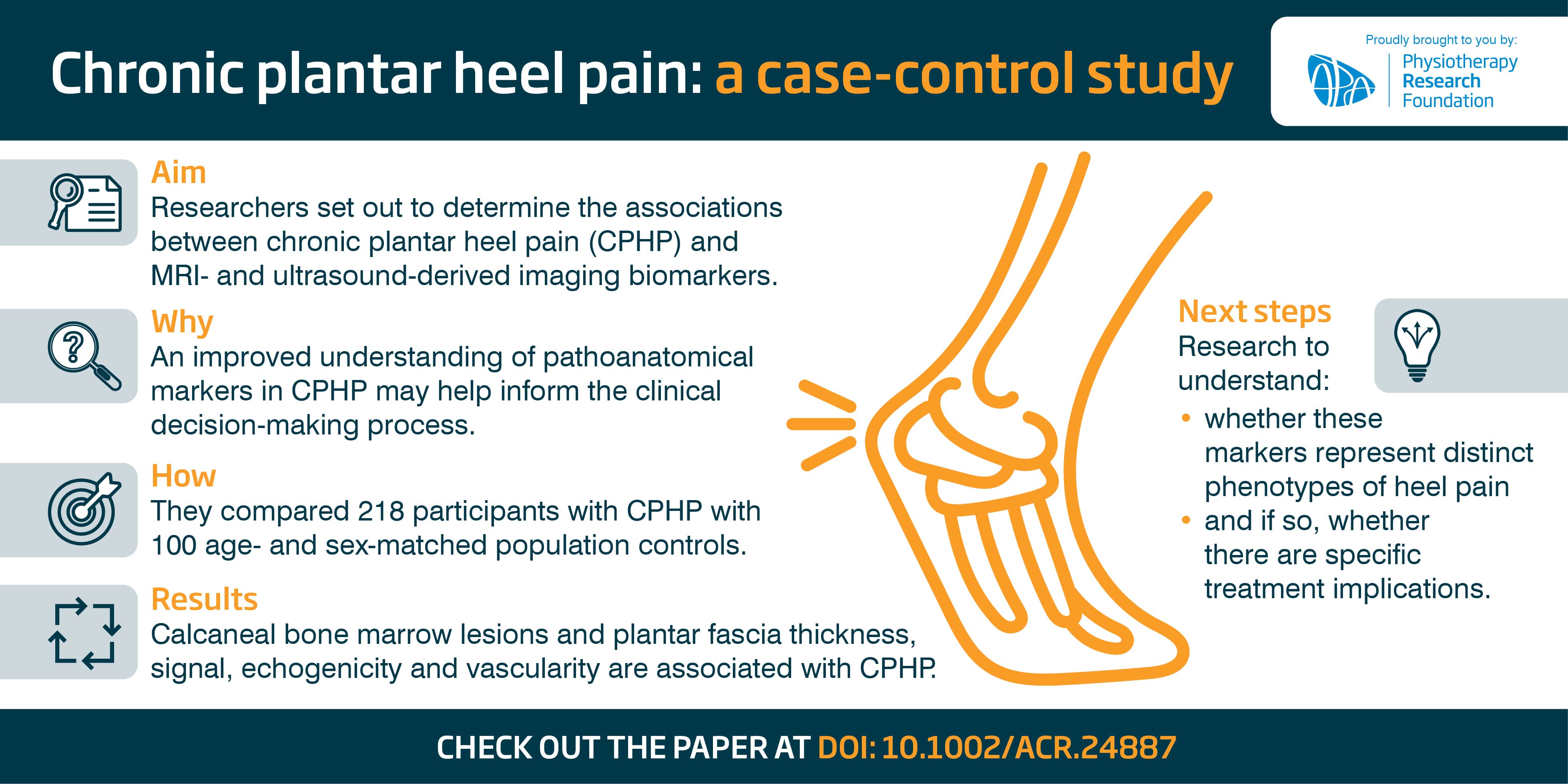Chronic plantar heel pain: a case-control study
Chronic plantar heel pain (CPHP) is the most common reason people with musculoskeletal foot pain consult a healthcare practitioner, and it encompasses a range of conditions, including plantar fasciitis. New research, however, is starting to shed some light on risk factors and causes of heel pain, suggesting better, evidence-based approaches to treatment.
‘The foot is often considered in a separate light by physiotherapists,’ says researcher Dr Jason Rogers APAM. ‘We don’t seem to take the same approach to pain and tendon-like structures in the foot as we do in other areas.’ Jason has recently completed a series of studies describing different heel pain phenotypes, risk factors and predictors of outcomes, including the important role of psychological, pain processing and bone imaging factors in CPHP. This work was supported by a PRF Seeding Grant awarded to Dr Jason Rogers in 2014. Read here.
The research study’s findings have been summarised by the Physiotherapy Research Foundation (PRF) and transformed into this infographic. To read the research abstract, click here. Click on the image below to access a printable A3 file.
About the researchers:
Jason Rogers, APAM, is an APA Musculoskeletal Physiotherapist and a postdoctoral researcher at the Menzies Institute for Medical Research in Tasmania. He has over 20 years of clinical experience and almost as many years of dedication to ongoing study. With a particular interest in foot and ankle injury, he is currently completing his PhD at the Menzies Institute. Jason also has an interest in managing other lower limb injuries, spinal pain, headaches and jaw (TMD) complaints.
As a Founding Director of AllCare Physiotherapy, Jason regularly contributes to teaching and lecturing with the Antarctic division, UTAS Medicine course, GP groups and the research circuit, and is a published author.
Graeme Jones is a Professor of Rheumatology and Epidemiology, Head of the Musculoskeletal Research Group at the Menzies Institute for Medical Research in Tasmania and a rheumatologist in private practice. Professor Jones was Tasmanian Scientist of the Year in 2013 and won the 2014 UTAS Research Excellence Medal.
Jill Cook APAM, is a Professor in musculoskeletal health in the La Trobe Sport and Exercise Medicine Research Centre at La Trobe University in Melbourne, Australia. Jill’s research areas include sports medicine and tendon injury. After completing her PhD in 2000, she investigated tendon pathology, treatment options and risk factors for tendon injury. Jill currently supplements her research by conducting a specialist tendon practice and lecturing and presenting workshops both in Australia and overseas.
Kathryn Squibb is a Postdoctoral Research Fellow at the Menzies Institute for Medical Research in Tasmania, using ultrasound, DXA and High Resolution peripheral Quantitative CT (HRpQCT) to investigate musculoskeletal conditions in a number of projects. Roles in these projects include sonography, radiography, data analysis and writing of manuscripts.
Andrew Halliday completed a Bachelor of Science (Pharmacology) from the University of Queensland in 1993. Andrew completed his Medical training at the University of Newcastle in 2000 and then worked in Brisbane, Sydney and the NT. Andrew then completed his Radiology training through the Royal Hobart Hospital (2010). Andrew has practised at Radiology Tasmania since 2010 and holds a Staff Specialist position at the Royal Hobart Hospital.
Karen Wills is a Research Fellow in Biostatistics at the Menzies Institute for Medical Research in Tasmania. She provides research design advice, data analysis and statistical support for a wide range of clinical and epidemiological research projects at both Menzies and the Royal Hobart Hospital. She is the Unit Co-ordinator for Introductory Biostatistics, a core unit of the online Master of Public Health degree offered by the University of Tasmania.
Aroub Lahham is a physiotherapist Research Fellow within the Respiratory Care Group of the Department of Allergy, Immunology and Respiratory Medicine. Currently, Aroub is the trial coordinator of the NHMRC-funded multi-centre trial, Early HomeBase, which aims to test the effect of Home-based Pulmonary Rehabilitation for people after hospital admissions due to exacerbation of chronic obstructive pulmonary disease.
Tania Winzenberg is a Professor in Chronic Disease Management at the Menzies Institute for Medical Research in Tasmania. She is a member of the Australian and New Zealand Bone and Mineral Society (ANZBMS), the ASBMR and the Australian Association of Academic Primary Care and is a fellow of the RACGP. She is an invited member of the Therapeutics, the Professional Affairs and the Research Committees of the ANZBMS. Her contributions to the RACGP are numerous, including as Deputy Chair, National Standing Committee Research, chairing the RACGP’s Australian Family Physician Award Selection Committee and serving on the RACGP National Research Awards Committee.
This #infographic is a PRF initiative supported by Pain Away Australia, Australia’s No. 1 joint & muscle spray, and cream topical pain relief brand containing arnica and naturally derived active ingredients, and partner of the PRF.


